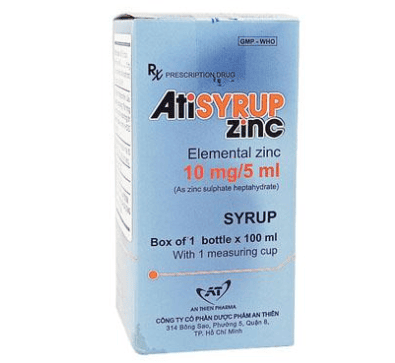This is an automatically translated article.
Daysamin contains many vitamins and minerals, is indicated in cases including weak body, growing children, emaciation, fatigue, dystrophy, malnutrition, rickets and the elderly. So, what is the dose of Daysamin used?1. What are the effects of Daysamin?
Daysamin contains many vitamins and minerals such as vitamin E, PP, B1, B2, B6, lysine and calcium glycerophosphate. These are all essential vitamins and minerals, involved in many basic metabolic processes of the body. The uses of each ingredient in Daysamin are as follows:Vitamin E: The most important role of vitamin E is as an antioxidant, helping to increase vitamin A absorption and protect vitamin A from degradation. Vitamin E is abundant in food. The richest sources of vitamin E are vegetable oils, especially wheat germ oil, sunflower oil, cottonseed oil, cereals, eggs. Vitamin B6: When entering the body, it is converted into pyridoxine phosphate and pyridoxamine phosphate. These two substances act as coenzymes in protein, glucose and lipid metabolism. Pyridoxine participates in the synthesis of gamma aminobutyric acid (GABA), an important transmitter in the central nervous system and participates in the synthesis of hemoglobulin. Vitamin PP: When entering the body, it is converted to NAD or NADP, these two substances act as a coenzyme that catalyzes the oxidation - reduction reactions essential for tissue respiration, carbohydrate metabolism, fatty acids, and amino acids. . Vitamin B1: In the body, it will be converted to thiamin phosphate, which is the active form. It is a coenzyme that metabolizes carbohydrates, decarboxylates pyruvate, and alpha ketoglutarate and is involved in pentose utilization. In vitamin B1 deficiency, the oxidation of alpha cetoacids is affected, causing pyruvate levels to rise and being an indicator of vitamin deficiency. Vitamin B2: Participates in the metabolism of lipids, purines, amino acids. Vitamin B2 also plays an important role in the breakdown of many other compounds in the body. Calcium: Calcium is an essential element for bone formation. Adequate calcium intake is essential for both children and adults, especially over the age of 40, to prevent calcium deficiency leading to osteoporosis. In addition, calcium salts play an important role in the regulation of cell membrane permeability, mucosal integrity, and cell adhesion.
2. Indications of the drug Daysamin
Indications of Daysamin are vitamin and mineral supplements in cases of physical weakness, growing children, wasting, fatigue, dystrophy, stress, malnutrition, rickets, anorexia, growth retardation and Elderly.
3. Contraindications of the drug Daysamin
Daysamin is contraindicated in the following cases:
Patients are allergic to the ingredients of the drug. Do not take Daysamin for a long time with other drugs containing Calcium Note that vitamin PP is not used in patients with severe liver failure, advanced peptic ulcer, arterial bleeding, severe hypotension.
4. Dosage and usage of the drug Daysamin
Dosage will depend on the pathology and characteristics of each specific patient. To find out the most appropriate dose, patients should consult a healthcare professional. Below is the reference dose of Daysamin for adults and children:
Children over 10 years old: Take 1 tablet per day Adults: The usual dose is 2-3 tablets per day.
5. What are the side effects of Daysamin?
Vitamin E : Vitamin E does not cause any side effects when taken in usual doses. However, taking vitamin E in high doses can cause nausea, upset stomach, diarrhea, laryngitis, or dizziness.
Vitamin B1: Adverse reactions to vitamin B1 are very rare and may be of an allergic pattern. Patients may experience profuse sweating, anaphylactic shock, or acute hypertension.
Vitamin B2: Currently, there are no adverse effects when using vitamin B2. However, high doses of vitamin B2 urine will turn pale yellow, causing errors in laboratory urine tests.
Vitamin B6: Doses of 200mg/day and long-term (over 2 months) can cause severe peripheral neuropathy such as unsteady gait, numbness of feet/hands. This condition can be reversed after stopping the drug, but it can still leave some sequelae.
Vitamin PP: Small doses of Vitamin PP are usually not toxic, however, if taken in high doses, side effects such as nausea, itching, flushing of the face/neck, burning, stinging or stinging sensation in the skin may occur. .
6. What are the precautions when taking Daysamin?
When using Daysamin, patients should note the following issues:
Vitamin B2: Patients should note that vitamin B2 deficiency often occurs when other B vitamins are lacking. Therefore, it is necessary to take adequate supplements to ensure the essential functions of the body. Vitamin B6: Taking high doses of about 200mg per day for more than 30 days can cause symptoms of vitamin B6 dependence. Vitamin PP: Patients should be cautious when taking high doses of vitamin PP in cases including: history of peptic ulcer, history of jaundice or liver disease, gallbladder disease, gout, gouty arthritis, and diabetes.
7. Daysamin drug interactions
The following are some important drug interactions, which should be noted when using Daysamin:
Vitamin E: Antagonizes the effect of vitamin K, should increase blood clotting time. Therefore, patients should be careful when using vitamin E together with anticoagulants vitamin K. Vitamin B2: There have been reports of some cases of B2 deficiency in patients treated with clopromazine, imipramine, amitriptyline and adriamycin. In addition, alcohol and probenecid can interfere with intestinal absorption of B2. Vitamin B6: Vitamin B6 may decrease the effectiveness of levodopa in the treatment of Parkinson's; however this does not happen with a mixture of levodopa - carbidopa or levodopa - benserazide . Doses of 200 mg/day may cause a 40-50% decrease in phenytoin and phenobarbital blood levels in some patients. In addition, vitamin B6 may alleviate symptoms of depression in women taking oral contraceptives Vitamin PP: Concomitant use with HMG-CoA reductase inhibitors (statin drugs) may be associated with an increased risk of muscle wasting cloud. Concomitant use of vitamin PP with alpha-adrenergic blocking agents may lead to excessive hypotension. In addition, patients should note that vitamin PP should not be used concurrently with carbamazepine because it causes increased plasma carbamazepine concentrations leading to increased toxicity. In summary, Daysamin helps to supplement many essential vitamins and minerals for the body. Patients should consult their doctor or pharmacist before taking the drug to ensure maximum effectiveness.
Please dial HOTLINE for more information or register for an appointment HERE. Download MyVinmec app to make appointments faster and to manage your bookings easily.













